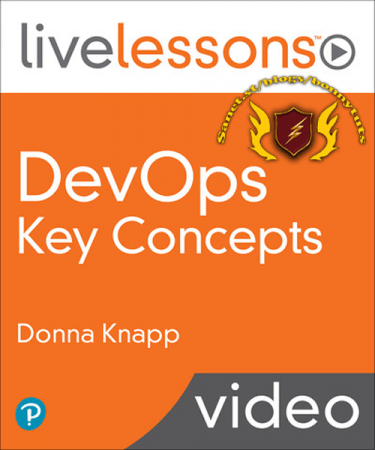
MP4 | Video: h264, 1280×720 | Audio: AAC, 44.1 KHz, 2 Ch
Genre: eLearning | Language: English | Duration: 27 Lessons (3h 52m) | Size: 4.22 GB
Learn DevOps key concepts, including its values, principles, and, at a high level, its practices. With this in mind, understand why the business is driving DevOps and where and how to start achieving a DevOps transformation
Overview
In this course, you learn the key concepts—the what and why—of DevOps. Join Donna Knapp, curriculum development manager for ITSM Academy, to learn how this movement is enabling organizations to establish workplace cultures and environments that enable them to continuously deliver software rapidly, frequently, and reliably. Explore the business benefits of DevOps through real-world examples paired with industry statistics. Also, dive into the relationship between DevOps and other frameworks, such as Agile, Lean, IT service management (ITSM), DevSecOps, Site Reliability Engineering (SRE), and Value Stream Management.
About the Instructor
Donna Knapp has more than 30 years of experience in the IT industry and for the past 15 years has been ITSM Academy’s curriculum development manager. Donna’s years of practical experience and love of learning show in her engaging and informative speaking style and many certifications, including ITIL Managing Professional, ITIL Strategic Leader, Certified Process Design Engineer, DevOps Foundation, DevOps Leader, DevOps Test Engineering, Continuous Delivery Architecture, DevSecOps Foundation, Site Reliability Engineering Foundation, Certified Scrum Master, Certified Agile Service Manager, Certified Agile Process Owner, Knowledge-Centered Support, and VeriSM Foundation. Donna was the lead developer for the DevOps Institute’s DevOps Foundation course, is the author of the ITSM for DevOps and Certified Agile Process Owner (CAPO) courses, and recently teamed with Michael Orzen (co-author of Lean IT) to develop a Value Stream Mapping Fundamentals course. Donna is the author of The ITSM Process Design Guide: Developing, Reengineering, and Improving IT Service Management (which serves as the foundation for the Certified Process Design Engineer qualification), as well as two college textbooks, A Guide to Service Desk Concepts, Fourth Edition, and A Guide to Customer Service Skills for Service Desk Professionals, Fourth Edition. Donna is also a member of the ITIL 4 examination panel. Donna is a huge fan of W. Edwards Deming and is notorious for evoking his wisdom (#donnasaiddeming).
Learn How To
Get a high-level understanding of DevOps, including its culture, practices, and automation aspects
Understand the benefits and results that organizations can realize by adopting DevOps
Learn how to improve the flow of work between Dev and Ops
Explore the relationship between DevOps and other frameworks such as Agile, Lean, IT Service Management, and Site Reliability Engineering
Start building a DevOps environment at your organization
Who Should Take This Course
Early to mid-career software developers, engineers, IT operations teams, or anyone involved in application development; managed service providers; service management process owners, process managers, managers, and business stakeholders.
Course Requirements
Some familiarity with modern software engineering and IT operations practices are desirable but not required.
Lesson Descriptions
In Lesson 1, “What is DevOps?,” you learn what DevOps is and is not, who the stakeholders are, what type of organizations are adopting DevOps and the business drivers leading them to do so, what doing DevOps entails and the business value it delivers, and key metrics to use to benchmark performance.
In Lesson 2, “DevOps Key Concepts,” you learn core DevOps values (CALMS) and principles (The Three Ways) and how DevOps integrates with other frameworks, such as Agile, Lean, IT Service Management, and Safety Culture.
In Lesson 3, “DevOps Practices,” you learn how to align the most common DevOps practices with The Three Way of DevOps (flow, feedback, and continual experimentation and learning) to achieve goals and outcomes. You also explore the related DevOps practices of DevSecOps, Site Reliability Engineering, and Value Stream Management.
In Lesson 4, “Achieving a DevOps Transformation,” you learn the science of DevOps, how to drive value in your organization by accelerating the delivery of software through DevOps, the importance of transformational leadership, how to begin a successful DevOps transformation at your organization, and how to mitigate risk by leveraging the critical success factors of DevOps.
Password/解压密码www.tbtos.com